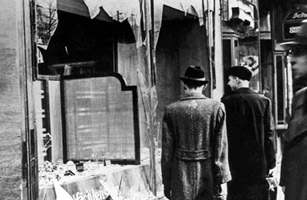
A Jewish shop in Berlin rampaged by Nazis during the attacks of Kristallnacht.
Nov. 9, 1938
In 1938 I was 21, living in Würzburg in southern Germany and studying at the Jewish Teachers' Seminary. I was supposed to have an exam on Nov. 10, the final one before I would have got my diploma that would have made me a Hebrew teacher.
So on the ninth, I headed home early in the evening and went to bed at 9 so I would be refreshed the next morning. We had already heard a few days before about the assassination of Ernst vom Rath, an official at the German embassy in Paris, killed by a Polish Jew, and it was a very bad omen. Everything went fine until about 2:30 in the morning, when we were awakened by a big crash. I got up and didn't know what might have happened. I lived in a large dormitory room with two friends. I thought that it was something terrible and that we should be ready to meet the emergency. We packed our valises in case we needed to leave. We heard people coming closer, and we tried to lock our door. I don't know if we opened it or if they broke it, but they were Nazis dressed as civilians. They said, "Throw your bags against the windows." And they went down the hall and threw three typewriters against the windows, and then they came back and went to the big dormitory room and broke several more things, like the faucets in the sink and the hanging lamps.
About 6 the next morning, a whole group of people came, as if they were looking at a museum, to enjoy themselves and see what the Nazis had done in our building. One man, another Nazi in civilian clothes, told us to go outside and form a line five abreast in the cobblestone street. As we walked along, the civilians at the side spat at us and called us names. We passed by the burning synagogue as they led us to the prison, and all these onlookers, they were laughing, they were shouting, and they were spitting.
Kristallnacht was a turning point because up to that time, the Nazis did not openly incite the whole population to kill publicly. Before, people were killed secretly and individually, but this happened openly. After that night, the whole world knew it would not get better at all, and Jews knew only a dark future. It was called the "Night of Broken Glass," but it was more than that. You can clean up glass, but you cannot do that with people.
Rabbi Wiener, 86, gives tours and speeches at the U.S. Holocaust Memorial Museum and lives in Silver Spring, Md.